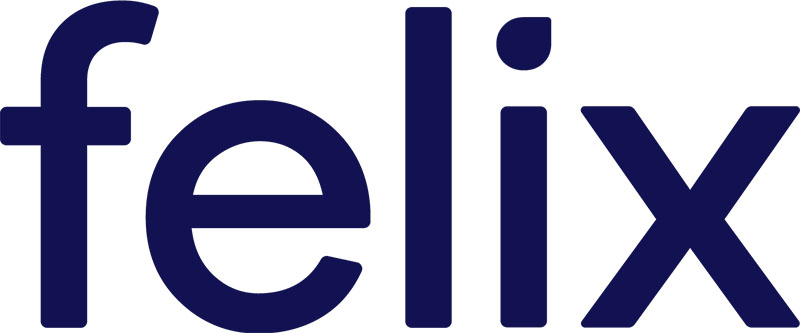Sustainable and online-only telco Felix Mobile is officially live in Australia, marking TPG and Vodafone’s first combined move into the competitive low-cost SIM-only market.
With a focus on green-friendly values and a single, simple plan, Felix Mobile is aimed at customers wanting a fuss-free mobile service with unlimited talk, text and data (with a catch). However, Felix is facing some stiff competition, both in carbon neutral Telstra offshoot Belong and Optus’ upcoming digital-only brand, Gomo.
With the three major mobile networks now going head-to-head with the smaller providers to sign up SIM-only customers, are Aussies now spoilt for choice when it comes to mobile plans – or will these new telcos push out independent brands that don’t have the same resources?
Felix Mobile: endless data for $35 per month
First announced in October 2020, Felix Mobile has officially launched its SIM-only service in Australia, offering a single plan priced at just $35 per month. Offered on a postpaid basis, the auto-renewing plan features the following monthly inclusions:
- Unlimited standard national talk in Australia
- Unlimited standard national texts/MMS in Australia
- ‘Endless’ data use in Australia, capped at 5Mbps speeds
- Coverage on the Vodafone 3G/4G networks

Like parent company Vodafone, Felix Mobile will offer what is calls ‘endless’ data each and every month. What this means is unlimited data use with no overage fees – but speeds will be limited. Data comes with a speed cap of 5 megabits per second (Mbps), which is fast enough for general web browsing and social media use, as well as most high definition video streams.
Generally, this speed shouldn’t stop you from using your device as normal, but with Vodafone in the process of rolling out its new 5G network in major cities, it’s an interesting choice. If you’re keen to get your hands on a new 5G-ready smartphone, such as the iPhone 12, Samsung Galaxy Note 20, or Google Pixel 5, you won’t be able to access 5G speeds on this plan – and you might find the speeds you do achieve to be underwhelming if you want to download files, upload content or stream HD YouTube on the go.
However, if you’re not looking to jump on 5G coverage any time soon, you don’t use your phone for intensive streaming or gaming when away from WiFi, and you simply want an affordable plan without the risk of excess usage fees, you’ll probably do just fine on Felix Mobile.
While the service renews each month, it’s contract-free and you’re able to cancel at any time through the Felix Mobile App. If you’re uncertain about Felix Mobile’s speeds or service, the brand’s ‘7 Day Happiness Guarantee’ allows you to cancel your plan within seven days of activation for a full refund.
Although international extras aren’t included in the standard $35 plan, they are available as optional add-ons. Customers can add unlimited calls texts to over 40 selected countries for $5 per month, and 4GB of roaming data (capped at 5Mbps) plus 100 standard minutes and 100 standard SMS to use in over 40 selected countries for $20.

Felix vs Belong: ‘green’ telco showdown
Felix Mobile’s big selling point – besides its endless data inclusions – is its status as a carbon neutral telco operating on 100% renewable electricity (achieved by purchasing Renewable Energy Certificates to track renewable technology, such as solar or wind). Felix will also plant a tree on your behalf for every month you remain an active subscriber.
However, Felix isn’t Australia’s first carbon offset SIM-only telco, or the best-known. Telstra network operator Belong also offers 100% carbon offset mobile plans, with no lock-in contracts and a full speed data allowance of either 10GB per month (priced at $25) or 40GB per month (priced at $40).
Both Belong plans include unlimited standard national talk and text, plus an unlimited data bank to roll over those unused gigabytes each month. Belong’s $40 plan also includes unlimited calls and texts to 30 selected countries including China, India, New Zealand, the UK and USA.
Coming soon: Gomo by Optus
Not be outdone, Optus is also preparing to launch a new SIM-only brand that will offer coverage on both 4G and 5G networks. Named ‘Gomo’, the upcoming service will be digital-only, and entirely managed from the Gomo app.
While we don’t have plan details for Gomo just yet, it’s safe to say the new telco will focus on the same low-cost, flexible postpaid market targeted by Felix Mobile and Belong. But by offering 5G network access where available, Gomo may have an edge over the speed restrictions imposed by Felix, even if its data inclusions aren’t unlimited.
Optus announced its future Gomo launch the same day it revealed plans to purchase leading prepaid brand Amaysim. With a customer base of around 1.2 million users, Amaysim is the country’s fourth-largest telco, meaning Optus is set to acquire one of its biggest prepaid competitors and a huge chunk of the low-cost mobile market share.
Compare SIM-only plans
Here is a selection of postpaid plans from Canstar Blue’s database with a minimum of 20GB of data, listed in order of standard cost, lowest to highest, then by data allowance, largest to smallest. Try using our mobile phone plan comparison tool to see a wide range of plans from other providers. This table includes products with links to referral partners.
Here is a selection of prepaid plans from Canstar Blue’s database with a minimum of 10GB of data each month, listed in order of standard cost, lowest to highest, then by data allowance, largest to smallest. If you want to compare a larger range of offers from other providers, use our phone plan comparison tool. This table includes products with links to referral partners.
The end of small telcos?
While the big three telcos will continue to push phone-on-a-plan options, an increased focus on offering lower-priced SIM-plans isn’t surprising in the current economic climate. With premium smartphones regularly priced at the $2,000+ mark, many Australians are looking to cut costs by holding onto current devices and switching to a cheaper BYO phone plan.
The ongoing success of SIM-only providers such as Boost Mobile and Amaysim – as well as supermarket brands like Woolworths, ALDI Mobile and Coles entering the telco game – shows that there’s still a huge demand for affordable, flexible mobile services in Australia.
But the influx of new brands backed by Telstra, Optus and Vodafone/TPG is likely to see the market share of smaller providers decrease, leading to less competition as the big three telcos dominate the low-cost end of the mobile industry.


Share this article